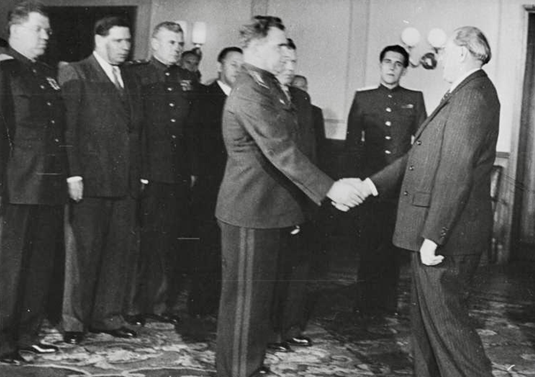A Military Adviser's Mission to China
- Maria A. Kithcart

- Feb 10, 2022
- 3 min read

Pictured: An attestation document for Major Kuzma Ignatevich Korolev for promotion to the rank of Polkovnik (Colonel); the second page displaying Lieutenant-General V. I. Chuikov’s signature dated 27 October 1940, near the time he met with Marshal Timoshenko about deploying to China. The signature line indicates Chuikov’s leadership of the Soviet 4th Army, which took part in the Polish campaign in mid-September 1939. In December 1939, he was transferred to command the 9th Army in North Karelia during the Winter War (Russo-Finnish War). Chuikov was transferred back to command the 4th Army in March 1940 until his deployment to serve as a military attaché to the Chinese government in December 1940.
Marshal Chuikov not only served in military leadership positions—he possessed years of diplomatic experience as well. The situation in China in the late 1930s was exacerbated by Japan's aggression at that time. During the Great Patriotic War, Chuikov successfully organized a united front to defend the borders of the Soviet Union against Japan from his position within China. Before his deployment, Vasily Ivanovich met with Marshal Timoshenko in Moscow and was considered as a natural choice for such an important task due to his previous experience in China in the late 1920s. Chuikov wrote about this meeting with Timoshenko in his book titled Mission to China:
“In the autumn of 1940, I was urgently summoned to [Marshal] S. K. Timoshenko, People's Commissar for Defense. At first, I did not see anything special in this challenge, the People's Commissar often met with army commanders to have first-hand information about the situation in the troops and in the district. But as soon as the doors of his office closed behind me, I realized that the conversation would be about something else. […]
The People's Commissar told me directly that the government did not believe in the reliability of the non-aggression pact with Germany, that Hitler, according to all information, was preparing for an eastern campaign. The government and the People's Commissariat of Defense realized that Germany would not come out against us alone. Then already, in the autumn of 1940, Semyon Konstantinovich almost completely outlined the composition of the Nazi military bloc: Germany, Italy, Romania, Finland. […] ‘We already have to keep a powerful barrier there against a possible Japanese intervention. In the event of a war on two fronts, great difficulties will arise due to the protracted communications... Japan is the main issue in connection with the threat of a German attack.’ […]
‘It can be assumed,’ the People's Commissar told me, ‘that the Japanese militarists will make every effort to either achieve victory over Chiang Kai-shek and the Kuomintang in 1941, or curtail hostilities and move on to peace negotiations. They need to free their hands by the time when Hitler will send troops against us—that is, be fully equipped for a big war to solve his problems in the east. Our task is to help China repel Japanese aggression. […] We have already provided and will continue to provide military assistance to Chiang Kai-shek,’ the People's Commissar added. ‘We must actively use it against the Japanese.’ […]
It was decided to send me first as a military attaché to the Chinese government. Then, when I entered the course of events, I would be appointed head of the Soviet military mission, i.e., chief military adviser to the Commander-in-Chief of the Chinese army, Chiang Kai-shek.
During this conversation, I learned from the People's Commissar that the Soviet government was giving China a lot of help with weapons. However, these weapons were not always used with due skill. There were frequent cases when Soviet weapons were reserved in the rear. Often, in unsuccessful battles for the Chinese, Japanese troops took these weapons as trophies. […] I had to teach them how to use modern weapons in the light of the latest tactical requirements. Moreover, my task as a military attaché and chief military adviser was to contain the militant aspirations of Chiang Kai-shek against the communist armies and partisan areas that were controlled by the Chinese communists. […] The chief military adviser was entrusted with the task of coordinating the actions of the Chinese Red Army and the troops of Chiang Kai-shek against the Japanese invaders, despite the differences between them.”



